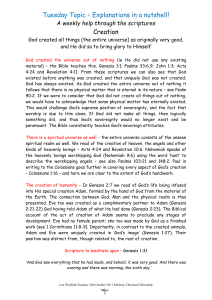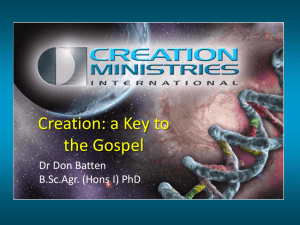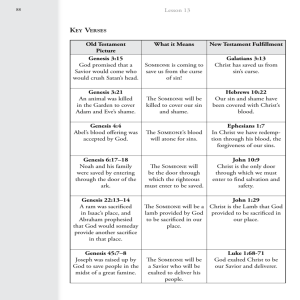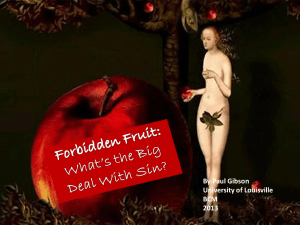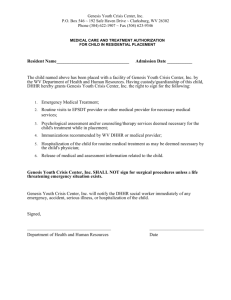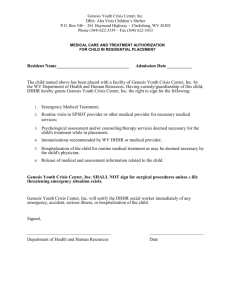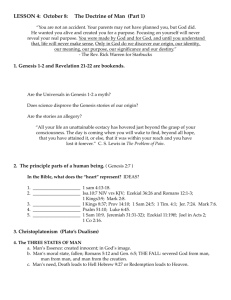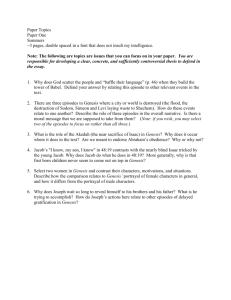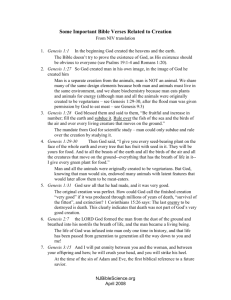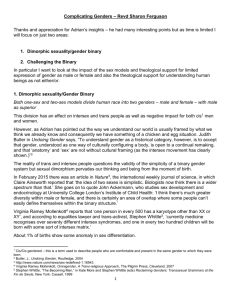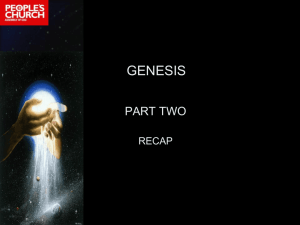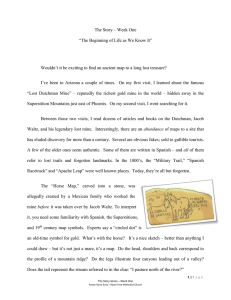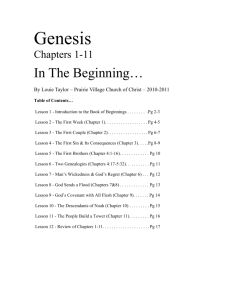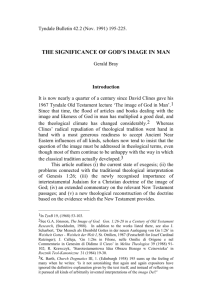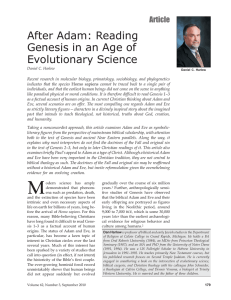Genesis 1 & 2 Image of God
advertisement
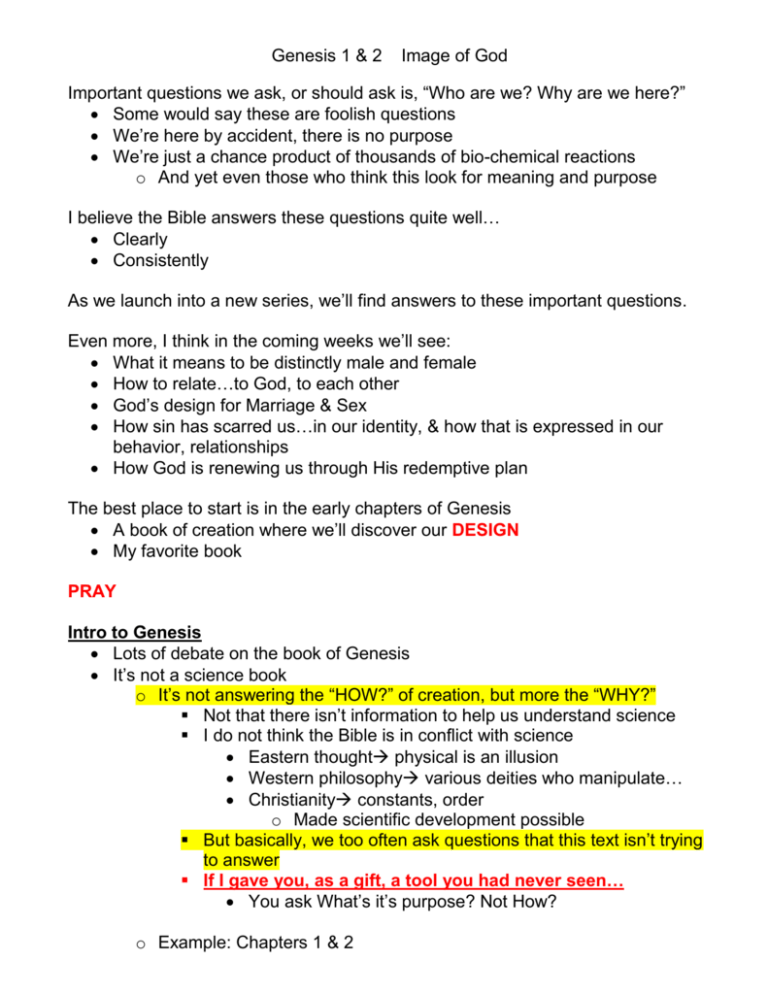
Genesis 1 & 2 Image of God Important questions we ask, or should ask is, “Who are we? Why are we here?” Some would say these are foolish questions We’re here by accident, there is no purpose We’re just a chance product of thousands of bio-chemical reactions o And yet even those who think this look for meaning and purpose I believe the Bible answers these questions quite well… Clearly Consistently As we launch into a new series, we’ll find answers to these important questions. Even more, I think in the coming weeks we’ll see: What it means to be distinctly male and female How to relate…to God, to each other God’s design for Marriage & Sex How sin has scarred us…in our identity, & how that is expressed in our behavior, relationships How God is renewing us through His redemptive plan The best place to start is in the early chapters of Genesis A book of creation where we’ll discover our DESIGN My favorite book PRAY Intro to Genesis Lots of debate on the book of Genesis It’s not a science book o It’s not answering the “HOW?” of creation, but more the “WHY?” Not that there isn’t information to help us understand science I do not think the Bible is in conflict with science Eastern thought physical is an illusion Western philosophy various deities who manipulate… Christianity constants, order o Made scientific development possible But basically, we too often ask questions that this text isn’t trying to answer If I gave you, as a gift, a tool you had never seen… You ask What’s it’s purpose? Not How? o Example: Chapters 1 & 2 Chapter 1: And God said let there be light and there was light…and it was good God said let there be “let there be waters…dry land…vegeatation…and it was so. And it was good. rhythm, repetition poetry Answers the question of “WHY of Creation?” for Worship If you were writing a paper for biology, would you use poetry? Try it, next time your professor asks a ?, sing your answer Ch. 1 is poetic intro. Chapter 2 we begin the narrative of Creation We’ll use 2 sections that deal with the creation of Man: Gen 1:26-27 Gen 2:18-25 Genesis 1:26-27 26 Then God said, "Let us make man in our image, after our likeness. And let them have dominion over the fish of the sea and over the birds of the heavens and over the livestock and over all the earth and over every creeping thing that creeps on the earth." 27 So God created man in his own image, in the image of God he created him; male and female he created them. –Genesis 1:26-27 We’ll talk specifically about the “male and female He created them” soon Preview (a borrowed outline from Tim Keller) Why we need Relationships What Relationships we need The Key to Relationships Why we need Relationship Image of God imago Dei o A shadow, a reflection o Not the same as, but a reflection of o It separates us from all of creation; we are unique Consider the pronouns o Yes, this speaks of the Trinity More on this in the New Testament Plurality of the Godhead o All other aspects of Creation: “God said…” Relationship is at the heart of Creation of humanity Proverbs 8:27-31 (see also John 1 & Col. 1) 27 When he established the heavens, I was there; when he drew a circle on the face of the deep, 28 when he made firm the skies above, when he established the fountains of the deep, 29 when he assigned to the sea its limit, so that the waters might not transgress his command, when he marked out the foundations of the earth, 30 then I was beside him, like a master workman, and I was daily his delight, rejoicing before him always, 31 rejoicing in his inhabited world and delighting in the children of man. Delight dance, frolic Creation was a group effort…full of delight & joy When God creates us, He is inviting us to the dance For us to be made in the Image of God, then is for us to be relational o Many important things this passage teaches us Dominion over the earth bring order where there was chaos To build, and create We are His “vice-regents” Shows our relationship to work, rest, the earth It speaks to the dignity of ALL people…ethnicity, religion, unborn & old, poor & disabled o If we are to reflect the plurality of God, then we need to be an “us” Let us make man in our image Gen. 2:18 WHY? b/c Adam by himself was not an “us” We cannot be all we were made to be unless we are in relationships What Relationships We Need o A deep personal relationship with God A Mirror only reflects properly when it is in “right relation” to that which it is trying to reflect. Being made in the image of God means that we will only accurately reflect Him as we are in right relationship to Him o It is only as we are in deep relationship with our Creator that we will accurately portray His image to the world o Luke & Me sleeping in t-shirts, boxers, Dr. Pepper In my image o AG & Lisa “Darn it…I’m about to have a melt down” In Lisa’s Image o And the only way we will experience all we were created for You want a life that fits…that works…go to your designer 2) Deep relationships with Others o Genesis 2:18-25 18 Then the LORD God said, "It is not good that the man should be alone; I will make him a helper fit for him." 19 Now out of the ground the LORD God had formed every beast of the field and every bird of the heavens and brought them to the man to see what he would call them. And whatever the man called every living creature, that was its name. 20 The man gave names to all livestock and to the birds of the heavens and to every beast of the field. But for Adam there was not found a helper fit for him. 21 So the LORD God caused a deep sleep to fall upon the man, and while he slept took one of his ribs and closed up its place with flesh. 22 And the rib that the LORD God had taken from the man he made into a woman and brought her to the man. 23 Then the man said, "This at last is bone of my bones and flesh of my flesh; she shall be called Woman, because she was taken out of Man." 24 Therefore a man shall leave his father and his mother and hold fast to his wife, and they shall become one flesh. 25 And the man and his wife were both naked and were not ashamed. Why is it that Adam, who lived in paradise, was lonely? Perfect environment, beauty, great food, good job, great prayer life… God created Adam with a need that living in paradise and even God Himself could not satisfy What does this tell you about the nature of God? o So what? Our culture says that fulfillment is found in stuff…achievement, possessions, influence Culture even says that you put relationships on the backburner so you can achieve the “good life” Too isolated, too individualistic… Electronic culture…Come to big groups, internet friends o So we can control how close people get to us o Boston “you know me better than anyone…” “I barely know you at all!” o Online friends you’ve never met o Keep people at a distance, no accountability A life of fulfillment requires people. Close relationships…community You can’t experience much of Who God is w/o community CS Lewis & Inklings: “I can have Richard to myself…” It’s the same way with us and God o There are things I see more clearly b/c of my close friends The danger is that areas of our life that never change o We hide from situations that might show the cracks in our armor Hebrews 3:13 But exhort one another every day, as long as it is called "today," that none of you may be hardened by the deceitfulness of sin. o Daily, face to face, close Sin deceives us, we think we’re OK Looking at a pictures of ourselves…(Lisa) We filter out our junk… Men we have acquaintances… o We need friends to tell us… Brad Evans o African-American culture I need friends like that We need people who are different than us o God didn’t bring Adam another guy o Not saying we don’t need same sex friends… Also don’t need ONLY opposite sex friends o But Eve is mysterious…different Helpmate one who compliments o People different culturally, gender, temperament, etc. o My Wife I see a different side of X in her, Empathy… Mercy Forgiveness Learn how costly it is to forgive o FALL RETREAT! 48 hours “I can’t wait until Monday…” We need relationships. We were made for relationships. The Key to Relationships What they had that we do not, but what Christ can give us V25 Naked and unashamed (in my wedding? ) No fear of rejection An environment of perfect acceptance and trust To be fully known and still loved Our world: We have to pretend to be loved We hide part of who we are b/c we fear rejection Our hiding keeps us from deep relationships Boston I was afraid of what they would think… My Marriage first year was tough…year #2 & trust Removing one brick at a time PS—this is one reason living together doesn’t work… Adam & Eve will lose this in Chapter 3 o They’ll try to cover themselves with a fig leaf… o It won’t work. God will have to make a covering for them. Jesus offers a spiritual covering for us. o He died in our place, suffered humiliation and rejection o He did this for us, He loved us, even though He knows us fully As we experience the love and acceptance of God… o It frees us to be transparent with others o As we find our security in Christ and His love for us, we are freed up from the fear of rejection o The more we understand and experience His great love for us, the more we are able to let down our guard, and our relationships go deeper As we grow in our understanding AND experience of the gospel, out of our experience of God’s unconditional love, we are no longer slaves to the acceptance of others. We find the freedom to be ourselves. You were made for relationships…with God, with each other. It’s necessary for us to live out our design, our purpose as men and women made in the Image of God Entering into a personal relationship with Christ is the key to experiencing the life and relationships God has for you. There is another, very important “lesson” we learn from the design of the universe. If the universe is the product of random forces, as modern secularism says, then how we live is up to us. We can create our own “purpose” in life, and devise our own standards of “right” and “wrong”. But most people who say cheerfully that this world is an accident refuse to face the implications of this or live consistently with it. Jean-Paul Sartre was more honest: God does not exist — and we have to face the consequences of this. We are strongly opposed to secular ethics that would like to abolish God and then find an a priori Good… In other words, nowhere is it written that we must be honest, that we must not lie — because we are on a plane where there are only human beings. Dostoyevsky wrote: “if there is no God everything is permitted.” CREATION notes 5 good world. The repeated expression “it was good” shows that material world and physical reality is intrinsically good. While the ‘orderliness’ of creation prevents us from overly fearful of science, the ‘goodness’ of creation leads us to respect natural resources rather than simply using technology to cut it up and turn it into commodity. Third “lesson”: The goodness of creation keeps Christians and Jews from the errors of so many religions and philosophies that believe we must leave the world or eschew physical pleasures in order to connect with God. This is not so much a contrast to Eastern philosophy as to Western. The Greeks (and many others) believed that the creation of the physical world was an accident or even a rebellious action of some lower ‘deities’. They taught that matter was the prisonhouse of the soul. It was intrinsically bad, dirty and stultifying to soul/spirit. Thus, in Greek thinking, the body was something to be transcended in order to reach spiritual heights. As a result, many in Western history have believed: 1) manual labor is demeaning, 2) sexual pleasure is intrinsically dirty or spiritually polluting, 3) salvation is obtained through denial of pleasures, 4) suffering is good in itself. In contrast to this legalistic view, Genesis 1-2 shows us a God with his “hands dirty”, creating the world, and deliberately putting a spirit in a body. Of course, the incarnation of Christ, and the resurrection of the body show us how Christianity is more pro-physical than any other religion. Even our future is a physical one! No other religion envisions matter and spirit living together in integrity forever. “but his crowning glory is his relation to God.” Only we are said to be made “in the image” of God. Though we will look at this more next week, it is clear that we have a closer relationship to God than any other creature. The metaphor of “image” means a “reflection” or a “small scale copy”. On the one hand, that means that we are like God — he is not Wholly Other and mysterious. On the other hand, that means we are not God. There is no indication of our being “part of God”. Most importantly, “image” contains the seeds of the idea of “sonship”. Just as children are born in the image of their parents, so we are called to be his children. “Confronted with cancer or a slum, the Pantheist can say, ‘If you could only see it from the divine point of view, you would realize this is also God’. The Christian replies, ‘don’t talk damned nonsense’. For Christianity is a fighting religion. It thinks God made the world — that space and time, heat and cold, and all the colours and tastes, and all the animals and vegetables, are things that God ‘made up out of his head’ as a man makes up a story. But it also thinks that a great many things have gone wrong with the world that God made, and that God insists, and insists very loudly, on our putting them right again.” – C.S.Lewis, Mere Christianity CREATION notes 9 Third, because everyone is made in God’s image, all people intuitively relate to God and know that he is “there” deep down. The image of God means that we are created into a relationship to God and we have that relationship even if we won’t admit it! That is Paul’s teaching in Romans 1:21ff and also in Romans 2. We can only renew our image if we develop a conscious and joyous relationship with him. But fundamentally, all people are depending on him and are being “held up” by him. Therefore, when we speak to non-believers about God, we do not need so much to prove the existence of God to them, as to prove to them that they already know that God is real and that they are relying on him in the way they live their lives every moment. For example, if there is no God, we should not act as if human beings are more valuable than rocks and trees, for we are all just the result of random forces. Yet we know that this is not true and we don’t live as if that is true. Also, if there is no God, there might be such a thing as moral feelings, but there could not be such a thing as moral obligation. Everything would be relative. Yet we unavoidably know that there is such a thing as real right and wrong, and we live that way. If there is no God, love is just a chemical reaction in my brain, and the air of significance we attach to it is all an illusion. But we know that this isn’t true. In short, no one can live as if there is no God. This is what we should point out to people.
